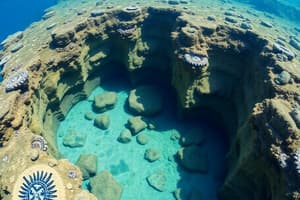Podcast
Questions and Answers
What is defined as a foliation in geology?
What is defined as a foliation in geology?
- Any planar fabric in a rock (correct)
- A specific type of mineral arrangement
- A type of metamorphic rock
- A fossilized layer in a rock
What does the term ‘boudinage’ refer to in geological terms?
What does the term ‘boudinage’ refer to in geological terms?
- The bending of rocks under pressure
- The formation of folds in sedimentary rocks
- The recrystallization of minerals
- A process of breaking apart rigid beds (correct)
How do plunging anticlines differ from synclines?
How do plunging anticlines differ from synclines?
- The end they close on indicates the direction of the plunge in anticlines (correct)
- Anticlines can only occur in sedimentary rock formations
- Anticlines open upwards while synclines open downwards
- Anticlines have horizontal hinges while synclines do not
What is the significance of the 'stem of the Y symbol' in geology?
What is the significance of the 'stem of the Y symbol' in geology?
What characterizes a mélange in geological terms?
What characterizes a mélange in geological terms?
What does the axial plane represent in a fold?
What does the axial plane represent in a fold?
What typically occurs in accretionary wedges?
What typically occurs in accretionary wedges?
What happens when rocks are overturned in a geological formation?
What happens when rocks are overturned in a geological formation?
Flashcards are hidden until you start studying
Study Notes
Fabric
- Fabric is a general term for the geometric arrangement of material within a rock.
- A foliation is a planar fabric in a rock.
- Folds and slaty cleavage are examples of foliation.
Boudinage
- Boudinage forms when a rigid bed is stretched amidst less rigid beds.
- The rigid bed breaks up, forming sausage-shaped boudins.
- The less rigid beds deform without breaking.
Plunging Folds
- Plunging anticlines/synclines occur when the hinge is not horizontal.
- Layers ‘close out’ at one end.
- In anticlines, the end they close on is the direction the fold plunges; synforms are opposite.
Fold Terminology
- Hinge: region of maximum curvature
- Limbs: relatively straight sides of the fold
- Axial Plane: surface that bisects the fold
- Fold Axis: intersection of axial plane and the folded surface
- Axial Plane Trace: intersection of the axial plane and the ground
Younging Direction
- Younging direction indicates the order strata were deposited.
- The stem of the Y symbol points in the younging direction.
- Way up indicators help determine younging direction (e.g. graded bedding, ripples, flame structures, mud cracks).
Folding and Younging
- If younging direction is unknown, use synform and antiform to determine the oldest rocks.
- If the oldest rocks are on the bottom, use syncline and anticline.
- If rocks are overturned, the oldest rocks are on top.
Accretionary Wedge
- An accretionary wedge is a mélange where material is scraped off the underlying plate and compressed into a wedge.
- Volcanic arcs are dominated by igneous processes that build mountains on and within the crust above a subduction zone.
- Thrust belts can develop behind arcs that experience significant compression.
- Thrust belts are associated with retro-arc foreland basin systems (characterized by thrust faults).
Mélange
- Mélange is a large-scale breccia with a lack of continuous bedding.
- Fragments of rock of all sizes are included in a fine-grained, deformed matrix.
- Mélange typically consists of a jumble of large blocks of varied lithologies.
- Mélange is commonly formed in the accretionary wedge above a subduction zone.
- Mélange broadly means "a varied mixture."
Studying That Suits You
Use AI to generate personalized quizzes and flashcards to suit your learning preferences.




